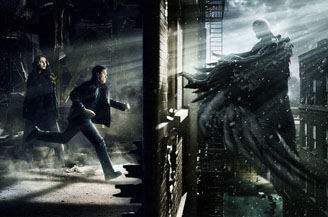Movie Review: Max Payne
By Matthew Huntley
October 28, 2008
BoxOfficeProphets.com

Max Payne, for all its style and high production values, is no different. I've never played the video game, but I doubt that experience is relevant to writing a valid review of the movie. Still, just so I had some frame of reference, the friend I saw it with told me it's hardly like the game, and I trust his word. Not that it matters.
Mark Wahlberg plays the titular character, Max Payne, a detective bereft and angry ever since his wife and baby were murdered. Payne now leads a life of solitude and endless investigating in the basement of a New York City police headquarters, where he compulsively sifts through files of unsolved murder cases. He routinely and deliberately seeks out scumbags in hopes they'll know somebody connected to his family's killer(s).
At a party hosted by his personal snitch (Andrew Friedman), Max meets the sexy Natasha (Olga Kurylenko) and questions her because of her peculiar tattoos. He figures she knows something even more useful because of the fuss her sister, Mona (Mila Kunis), makes when she crashes the party. Max brings Natasha back to his apartment but kicks her out when she insults his wife. Afterward, in a dark alley, she's attacked by Valkyrie and the next day found murdered with Max's driver's license in her hand.
Max's ex-partner, Alex (Donal Logue), notices a connection between Natasha's tattoos and the ones found on the arm of one of the suspects in Max's wife's murder case. Alex is later killed in Max's apartment and Max left unconscious by an unknown assailant. He wakes up in a hospital next to his father's old business partner, BB Hensley (Beau Bridges), who advises him to stop trying to solve an unsolvable murder and get on with his life.
The plot eventually leads down a silly and perfunctory road involving a drug called Valkyr, which causes users to hallucinate and imagine they're surrounded by Valkyrie only they can see. Max's wife was supposedly killed because she was getting too close to the men distributing the highly addictive Valkyr as a street drug (it was originally meant to enhance the strength of America's soldiers but proved to be too unstable). If you can't spot these "men," a.k.a. the bad guys, seconds after they appear on-screen, then you must hardly go to the movies.
There's not a whole lot to Max Payne. It's an averagely bad action movie with more style than substance, poor acting, extraneous dialogue and laughable scenes meant to be sincere. One particular scene stood out to me that illustrates the movie's lack of purpose. It's when Max meets BB at a restaurant and the two go out back to talk. Less than a minute later, Max storms off, but not before BB says to get back inside before he catches cold. This scene is so rapid you don't have time to justify why it was kept in the movie, let alone shot. Would Max really meet BB at a restaurant just to tell him one line of dialogue then leave? How far did he have to travel to get there? It seems like such a waste.
I mentioned the poor performances, but what's most unsettling is they're given by actors who typically display talent, especially Bridges. His character so artificial I never believed Max would be dumb enough to fall for his words. Chris O'Donnell also makes an appearance as a former colleague of Max's wife who's been withholding critical information, but even he leaves no valuable impression.
Even though I liked Mark Wahlberg in the lead role, I didn't care about Max Payne or his investigation. And I felt patronized during the flashback murder scene, which has been treated with a white, dreamy, washed out effect and the audio given an echo-like effect. How many times have we seen such a strategy for these kinds of scenes?
Max Payne doesn't work because it's based on a video game. No, it doesn't work because the director, John Moore, doesn't allot enough time for us to know or care about Max Payne as a person. We don't recognize his pain and suffering. He's a one-note detective with nothing but vengeance on his mind, a stock movie character, if you will, placed into a cheesy plot. The editing is sloppy, too, with many scenes slapped together without giving the characters within them enough motivation to behave the way they do. The movie ultimately lacks a human element, even in its darkest moments, and so we're unable to connect to it.
A lot of gamers, not all of them, tend to play video games because they look cool, and not because they have a deep story behind them. They simply like to see things blow up and participate in a lot of gratuitous violence, which they often lend a hand in causing. The filmmakers behind Max Payne are under the impression the same logic can be applied to the cinema, but the difference is the movies aren't interactive, at least not now. At the movies, we rely on the filmmakers to provide us the experience. With Max Payne, the experience finds style trumping substance, when it should be the other way around.